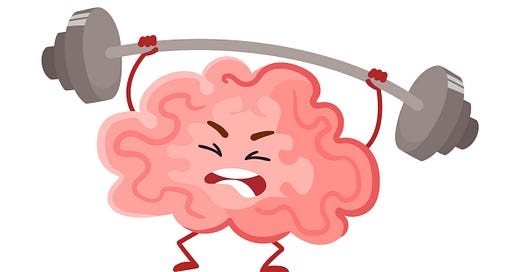Weekly Roundup: Weight Training and Cognitive Decline, Which Distractions are Worse, Long-Term Impacts of Trauma, and the Positivity of Music and Art
It’s a bumper edition this Easter Sunday starting with more research on physical activity on the brain and what stops us doing this, before looking at negative distractions, long-term impacts of traumatic experiences, and finishing off with how the brain gives us the chills when listening to music and how art gives meaning to life.
Can weight training reduce cognitive decline
I have reported multiple times on the benefits of physical activity and brain and physical health on these pages and the benefits to brain and body are wide-reaching and effective. Generally the advice is to engage in physical activity particularly moderate endurance style activities. The good news is that light physical activity also gives benefits to brain and body.
But should we be hitting the gym? There are some additional benefits to weight training or what is called resistance training. One is that the added strength is beneficial in many areas in life and can reduce natural strength decline in age and keep you mobile and active for much longer. But does it also have the same benefits on brain function?
This is what Isadora Ribeira et al. of Universidade Estadual de Campinas, Brazil investigated with 44 older participants who were already exhibiting Mild Cognitive Impairment (MCI) over 6 months. 22 participants underwent a strength training programme and the remaining 22 were the control group and continued their lives as normal.
At the start and end of the study participants underwent various cognitive tests and brain scanning.
The results were impressive: not only did those in the training group improve cognitive performance, 5 of them improved so much so as to no longer be diagnosed with MCI. The brain scanning data was also impressive showing preserved volume of the hippocampus, which as many of your know, is responsible for multiple memory functions, as was a region called the precuneus, which is a key brain hub, not to mention better white matter integrity. White matter is the term used to describe the bundles of fiber that connect different regions in the brain - so better connectivity.
So to answer the question of whether we should also be doing weight training - the answer is, yes.
But knowing that exercise is good for you is not really the problem. Most of us have known that since the beginning of time. It is sticking to an exercise routine that is a problem. And this is where the next piece of research comes in. Here another group of Brazilian researchers used AI to analyse a larger dataset to find out who sticks to exercise recommendations.
AI and activity
Knowing the predictors of who will stick to exercise guidance is important for health at the society level and gives us clues and the potential to design interventions for those most at risk.
Chloe et al. analysed data from almost 12’000 people using AI and this found three key predictors of exercise adherence. They were:
Sedentary time - the time people spend sitting. Those sitting the most time stick less to exercise plans.
Gender - men are more likely to engage in activity of any sort.
Education level - the more educated individuals were the more likely they were to engage in activity guidelines.
The reasons for the above could be multiple and also self-reinforcing as in the case of being sedentary.
Obviously there may be many individual reasons for not sticking to exercise guidelines but this gives us important information for identifying those most at risk and targeting these in more structured way.
From not sticking to exercise plans to getting distracted which happens to all of us, I am sure, in all areas in life. New research just out investigated what types of distractions have the largest impacts.
The Impacts Negative Distractions
In the modern world with modern devices the sources of distraction are ever present. But what type of disruptions cause the largest disruption?
Keep reading with a 7-day free trial
Subscribe to leading brains Review to keep reading this post and get 7 days of free access to the full post archives.





